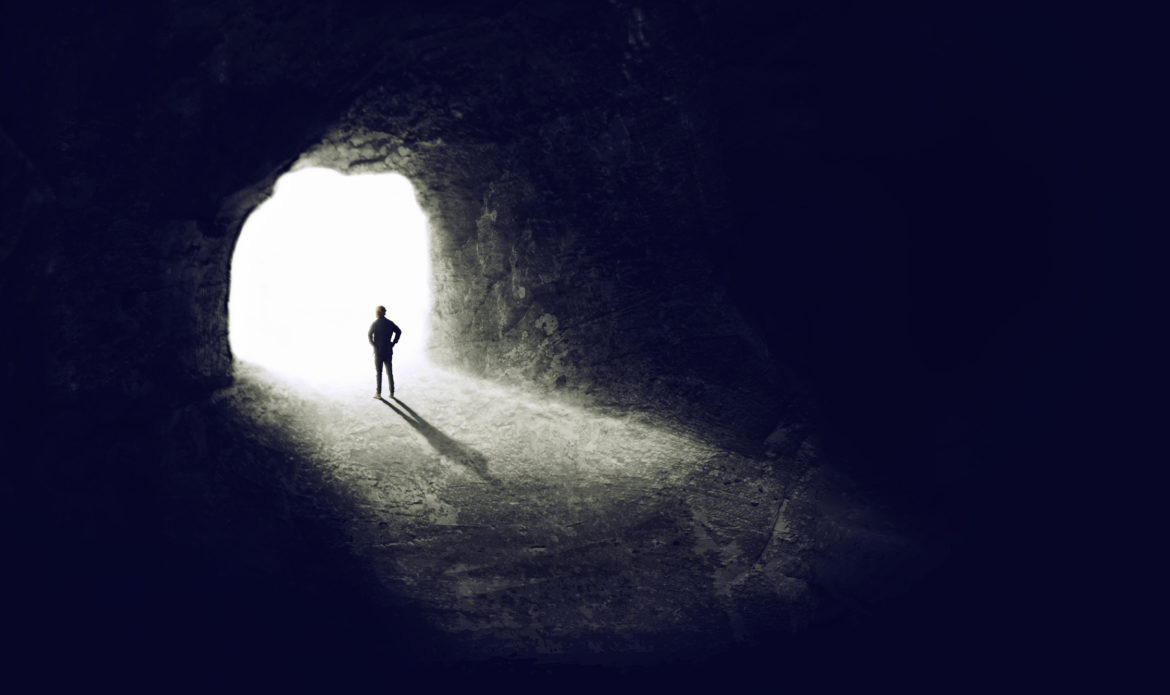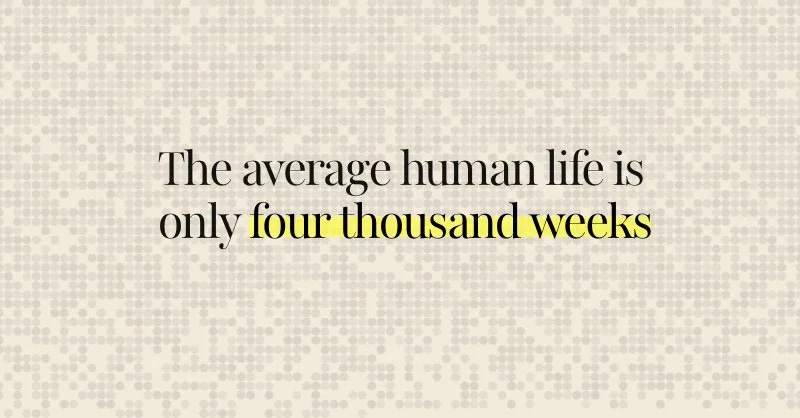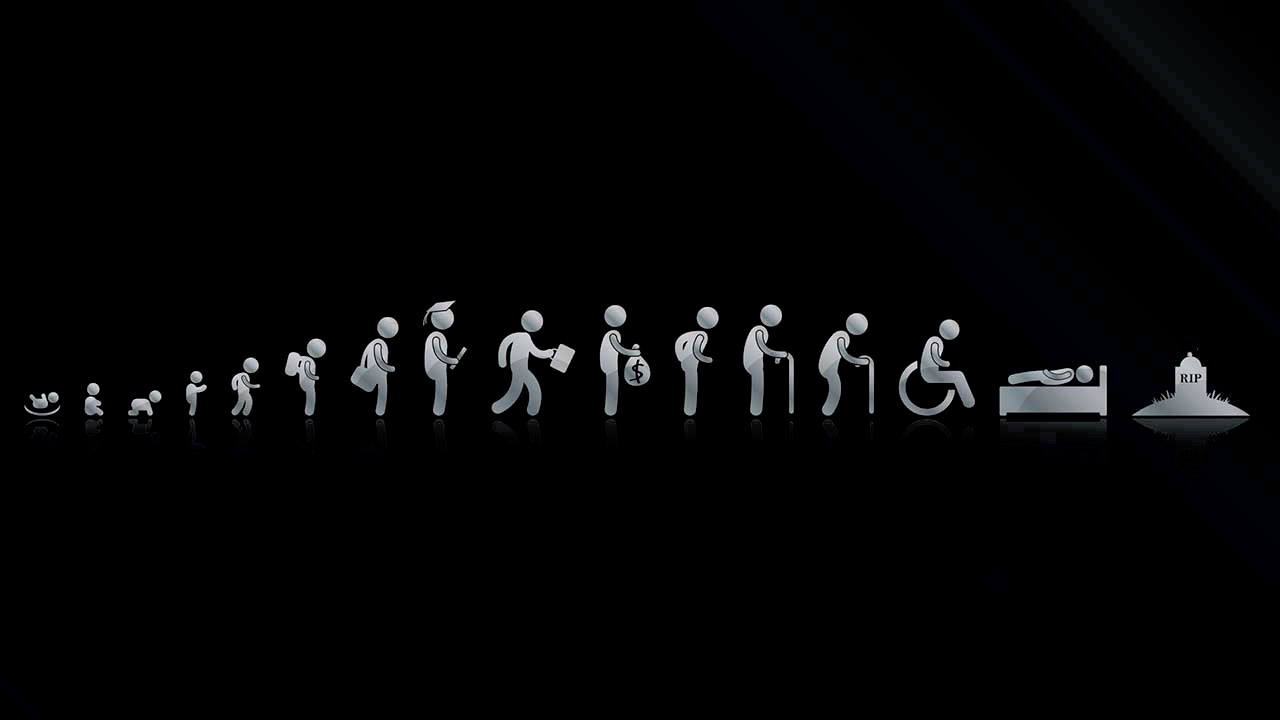Hello!
Thank you for reading the Brainwaves newsletter. I’m Drew Jackson, your content curator, and today I’m writing about death from the lens of being alive. Let’s dive in.
Before we explore today's topic, a quick reminder: Brainwaves is published every Wednesday, covering a range of subjects including venture capital, economics, space, energy, intellectual property, philosophy, and more.
I'm not an expert, but rather an eager learner sharing thoughts along the way. I welcome feedback, differing viewpoints, and healthy discussions that expand our horizons. If I make mistakes, please feel free to politely clarify or correct me.
If you enjoy this newsletter, please share it with friends, colleagues, and family. Now, let's delve into this week's topic.
Credit Gospel Reformation Network
Thesis: Looking at life through the lens of death is often an enlightening experience—knowing the goal helps further define the steps along the way. What do you want to live for? Knowing that while you’re alive is critical to achieving your vision.
Death, Dying, and You
I recently listened to the Secular Buddhism podcast “Death, Karma, and Mindful Living”. The following anecdote prompted me to write this post:
A close encounter with death can bring a real awakening, a transformation in our whole approach to life. About three years ago, my good friend and business partner, Jordan, was diagnosed with stage 4 melanoma. We had already been meeting regularly every Tuesday for lunch to discuss business, but over the next several months after his diagnosis, our topics of discussion were increasingly focused on life and death and our business matters kind of became secondary. Many months later, it became more and more clear that the end was getting closer, and I remember asking Jordan one time, “So Jordan, what does it feel like to know that you’re dying?” I was genuinely curious about what that would be like to know.
His response was so powerful and it caused a change in my perspective. He said, “I don’t know, you tell me.” He pointed out that I’m dying too. I just don’t know when, but there’s a chance that I could be in a car crash on my way home, and that I’d end up dying before him. He said, “Most likely, I’ll die before you, but there’s no guarantee, so what does it feel like to know that you might die before me?” He flipped the question on me. You see, we’re all dying. Some people just die sooner than others. Those who understand just how fragile life is, know how precious it is. We don’t need to go into a cave and meditate for the rest of our lives. We just need to start living in the present moment.
We’re all dying.
It’s a fact of life.
Not an if, but a when.
So, what can we learn from death and the fact that everyone is dying?
Let’s start with the thought of life, specifically how long you’ll live and what you’re living for:
Credit Reddit
4000 Weeks to Live
Last year, I had the pleasure to read Four Thousand Weeks: Time Management for Mortals book by Oliver Burkeman.
The premise is simple: the average human lifespan is terrifyingly short. The average human lifespan in the United States in 2021 was 76.33 years. If you measure this in weeks, the average human lives for around 3969 weeks (rounded to 4000 for an easier title/premise). The book states:
“Expressing the matter in such startling terms makes it easy to see why philosophers from Ancient Greece to the present day have taken the brevity of life to be the defining problem of human existence: we’ve been granted the mental capacities to make almost infinitely ambitious plans, yet practically no time at all to put them into action.”
Even more worryingly, there’s an odd phenomenon in life where we’re constantly running out of time and as we get older, the faster time seems to fly by. How long were the weeks when you were in elementary school? How long were the weeks in high school? In college? Once you started a career? Once you had kids? Once you retired?
When you segment your life into weekly buckets, you may begin to look at it differently:
“We sense that there are important and fulfilling ways we could be spending our time, even if we can’t say exactly what they are–yet we systematically spend our days doing other things instead. This yearning for more meaning can take many forms: it’s there, for instance, in the desire to devote yourself to some larger cause, in the intuition that this particular moment in history, with all its crises and suffering, might demand more from you than the usual getting and spending.”
Honestly, some days/weeks/months/and even years, it’s easier to avoid thinking about the past, present, and future of your life. If you really only had 4000 weeks to live, how would you choose to live them? That’s a challenging question—one that’s sometimes better avoided than faced head-on.
“After all, it’s painful to confront how limited your time is, because it means that tough choices are inevitable and that you won’t have time for all you once dreamed you might do. It’s also painful to accept your limited control over the time you do get; maybe you simply lack the stamina or talent or other resources to perform well in all the roles you feel you should. And so, rather than face our limitations, we engage in avoidance strategies, in an effort to carry on feeling limitless.”
There are times when, instead of avoiding the fact that I’m dying and my time is extremely limited, that I do the exact opposite. I begin to say yes to everything, making sure I have every single experience available and don’t miss anything.
“The problem with trying to make time for everything that feels important—or just for enough of what feels important—is that you definitely never will.”
That’s deep. Take a second to read it again.
The whole rationale behind the statement is the idea that you’re going to miss out on things (actually almost everything if you think about it). It’s this missing out that makes our choices meaningful (an opportunity cost).
“Once you truly understand that you’re guaranteed to miss out on almost every experience the world has to offer, the fact that there are so many you still haven’t experienced stops feeling like a problem. Instead, you get to focus on fully enjoying the tiny slice of experiences you actually do have time for—and the freer you are to choose, in each moment, what counts the most.”
Ready to get even more deep?
“The only real question about all this finitude is whether we’re willing to confront it or not, and this… is the central challenge of human existence: since finitude defines our lives… living a truly authentic life—becoming fully human—means facing up to that fact.”
Relating back to the Secular Buddhism Podcast referenced above, once you fully embrace your limited time and embrace the fact that you’re dying, you can finally understand the point of living—and, in doing so, achieve enlightenment.
Through this, you may experience a feeling such as the following:
“I happen to be alive, and there’s no cosmic law entitling me to that status. Being alive is just happenstance and not one more day of it is guaranteed.”
Taking a step back, you may be in a flummoxed mindset as you read the previous message. This may be your first time actively thinking about the scarcity of your time being alive. This may be your first time viewing your life through the lens of death.
No worries. It’s a difficult topic that only tends to get deeper as you continue delving into it. From this lens, the present moment becomes infinitely more important as you realize that you will never have that specific moment ever again.
“These truths about the uncontrollability of the past and the unknowability of the future explain why so many spiritual traditions seem to converge on the same advice: that we should aspire to confine our attentions to the only portion of time that really is any of our business—this one, here in the present.”
From this insight and through the lens that we’re all dying, we can rephrase the previous thoughts: Usually, there’s no way to know, in the moment itself, that you’re doing it for the last time. Therefore, we should therefore try to treat every experience with the reverence we would show it if it were the final time we would have that experience.
The book puts this concept in a slightly more comical and bleak way:
“Living more fully in the present may be simply a matter of finally realizing that you never had any other option but to be here now.”
To conclude, Burkeman writes:
“The average human lifespan is absurdly, terrifyingly, insultingly short. But that isn’t a reason for unremitting despair or for living in an anxiety-fueled panic about making the most of your limited time. It’s a cause for relief, you get to give up on something that was always impossible—the quest to become the optimized, infinitely capable, emotionally invincible, fully independent person you’re officially supposed to be. Then you get to roll up your sleeves and start work on what’s gloriously possible ahead.”
___
From a perspective of life (specifically around 4000 weeks of life), it’s interesting to see what you may or may not choose to value given your scarce time. How does this viewpoint change or deepen when you look at your life from the lens of death?
Credit Raiyan Foundation
What They’ll Say When I Die
One of the best ways to learn about your life is to write your obituary (what they’ll say when you die).
What do you want them to say when you die? What do you want to be remembered for? What impact did you make? Did you even make an impact?
A potential way to look at the answers to these questions is through a past-looking lens. Writing an obituary while you’re still living helps you understand where the “end” or “goal” is, literally what you lived for (or want to live for).
So, what would I want them to say when I die?
The following is a draft of my obituary:
Warren Buffet once was asked by a pilot what he should focus on in his life. Warren tells the man to make a list of the top 25 things he wants out of life and then to arrange them in order from the most important to the least. The top 5, Warren said, should be those around which he organizes his time. Contrary to what the pilot may have been wanting to hear, Warren detailed how the remaining twenty aren’t the second-tier priorities to which he should turn when he gets the chance. Far from it. In fact, they’re the ones he should actively avoid at all costs–because they’re the ambitions insufficiently important to him to form the core of his life, yet seductive enough to distract him from the ones that matter most.
For Drew, the top 5 things he wanted out of life were the following:
1) Endless curiosity and motivation to be the best version of himself
Drew’s favorite quote for most of his young adult life was a Chinese proverb, “When the student is ready, the teacher will appear.” Drew was constantly learning about himself and the world around him. He consistently read 5-12 philosophy books each year, listened to Buddhism podcasts each night, attended family church each week, read the news each morning, dissected current events affecting our future, and much more.
No one knows where it came from, but Drew was blessed with unending inner motivation—motivation to learn, to grow, to read an extra chapter, to work long hours, to network with those around him, to socialize, and much more. Through this motivation, Drew was able to strive for excellence and lasting positive change in everything he did.
2) Prioritizing connections, community, and giving back to others
Drew always valued the people around him. A large reason Drew became the person he did was because of others’ help along the way, whether that was through casual conversations, job referrals, long-term friendships, and more.
Drew believed that people were naturally good, and didn’t need pressure from external forces to give back to others, you could do it simply because they were human too. Drew often provided mentorship to his brothers, his parents, his peers, and his children. The best part of knowledge, experience, and wisdom—the true value they provide—is being able to give it to other people.
3) Consistently promoting positivity and optimism
Drew was rarely, if ever, sad or depressed. In every interaction you would have with him, he would be cracking jokes, putting a smile on your face, and would genuinely try to make your day better. The glass was always half full, there were always opportunities to see the good in people, to trust in their vision, to believe in their dreams.
To quote one of Drew’s favorite books, the Untethered Soul, “One of the ancient names for God in the yogic tradition is Satchitananda–Eternal, Conscious Bliss… If you want to be close to God, learn to be joyful. If you remain spontaneously happy and centered, no matter what happens, you will find God.”
4) Inspiring others to be the best versions of themselves
Drew pushed those around him to be the best versions of themselves every single day. He inspired them to be confident, to be efficient, to be effective, to be happy, to be satisfied, to be healthy, to learn, to grow, and much more.
Many times, this inspiration was given to people he didn’t know well, people that he interacted with once or twice who saw his example and subsequently decided to change. Other times, this inspiration was given to his life-long friends and family, expanding perspectives, creating positive change—building up every individual.
The tide lifted all boats.
5) Being true to himself and his values
Drew prided himself on the openness of his values, his life, and his story. Drew wasn’t afraid to question the status quo, to find his own doctrine, his own set of beliefs with which he resonated the most.
Drew was always happy to talk about his journey and his values, using other people to keep him accountable for his beliefs and his personal philosophy.
These beliefs changed as Drew experienced new perspectives, new ideas, and new principles. He was always open to learning and expanding upon his truth. Yet, no matter what his beliefs were at a given moment, Drew always strove to be true to himself and his values.
-
Drew was a great father, son, brother, mentor, and friend. Through the end, Drew continued to be true to what he believed and continued to inspire others to be true to theirs. Drew will be forever remembered for the impact he made on those around him.
Credit Unsplash
We’re All Dying
You, me, everyone—we’re all dying.
The lens of death is surely a unique way to look at life.
Yet, the insights you can gain through looking at your life through the lens of death can be extremely insightful and could be some of the best advice you’ll get while you’re still living.
If we accept this framework—accept the fact that we (along with everyone else) are dying—how should we live now?
My father is very big on the concept of outcomes vs. outputs, and I think this methodology applies perfectly to this scenario. To elaborate, outcomes are the end goal, what you’re working for. Outputs are the things that you’ll do along the way to get to the outcome.
To the problem of dying, we can prescribe the following outcome(s) and output(s):
Outcome: You, me, everyone—we’re all dying. The outcome of your life is simple: you’re going to die. That will be the end.
Yet, looking back on your life, there are other outcomes that should be considered: What outcome do you want to have in this life (i.e., what impact did you make)? What outcome do you want to have concerning yourself and your life (i..e., what did you live for)?
Your obituary is an excellent way of looking at what outcome(s) you had in this life, particularly emphasizing who you were as a person and what impact you had on the world. If you haven’t already done so, I would encourage you to write your obituary as you would want it to be read by someone at your funeral. What would they say? What would you be remembered for?
Output: Getting to your “outcome” is much less straightforward. I’ll reference the following quote from the 4000 Weeks book:
“All of this illustrates what might be termed the paradox of limitation: the more you try to manage your time with the goal of achieving a feeling of total control and freedom from the inevitable constraints of being human, the more stressful, empty, and frustrating life gets. But the more you confront the facts of finitude instead—and work with them, rather than against them—the more productive, meaningful, and joyful life becomes. I don’t think the feeling of anxiety ever completely goes away, we’re even limited, apparently, in our capacity to embrace our limitations. But I’m aware of no other time management technique that’s half as effective as just facing the way things truly are.”
It’s not a perfect science, but neither is really anything else in life. Continue to be true to yourself and follow your heart (cliché I know, but it is sound advice if your heart is in the right place).
To close, I believe the following statement from the 4000 Weeks book perfectly articulates the defining message behind the concept of the acknowledgment that we’re all dying, the subsequent acceptance of this fact, and the perspective with which we now view life:
“Your experience of being alive consists of nothing other than the sum of everything to which you pay attention.”
Pay attention to what you want to be known for.
See you Saturday for The Saturday Morning Newsletter,
Drew Jackson
Website: brainwaves.me
Twitter: @brainwavesdotme
Email: brainwaves.me@gmail.com
Submit a topic for the Brainwaves newsletter here.
Thank you for reading the Brainwaves newsletter. Please ask your friends, colleagues, and family members to sign up.
Dive deeper into Venture Capital, Economics, Space, Energy, Intellectual Property, Philosophy, and more!
Brainwaves is a passion project educating everyone on critical topics that influence our future, key insights into the world today, and a glimpse into the past from a forward-looking lens.
To view previous editions of Brainwaves, go here.
Want to sponsor a post or advertise with us? Reach out to us via email (brainwaves.me@gmail.com).
Disclaimer: The views expressed in this content are my own and do not represent the views of any of the companies I currently work for or have previously worked for. This content does not contain financial advice - it is for informational and educational purposes only. Investing contains risks and readers should conduct their own due diligence and/or consult a financial advisor before making any investment decisions. Any sponsorship or endorsements are noted and do not affect any editorial content produced.








